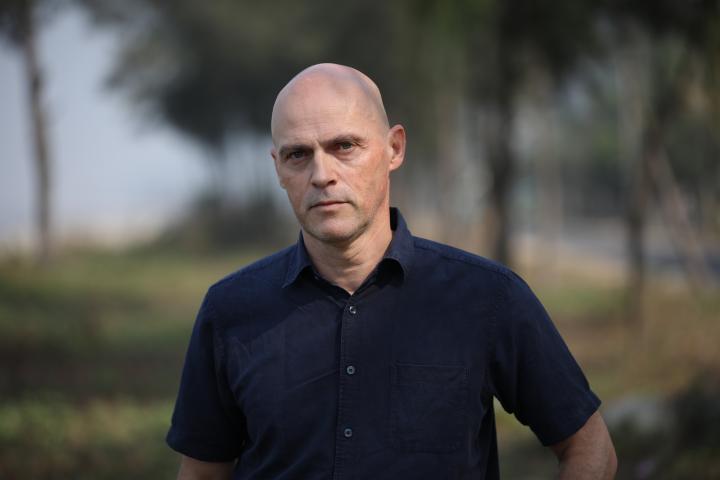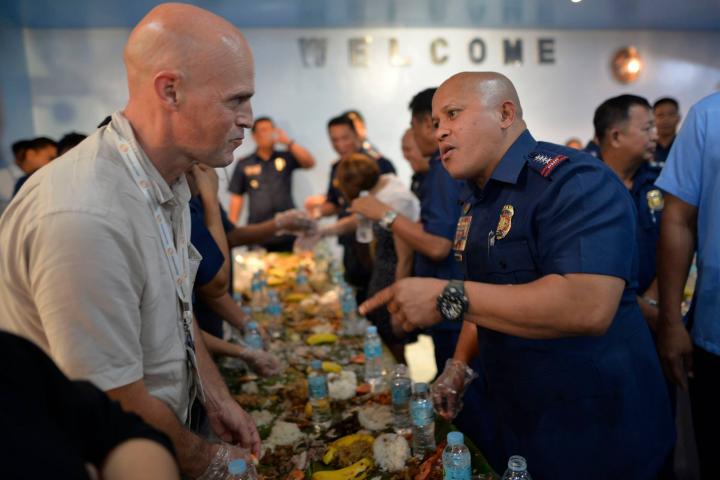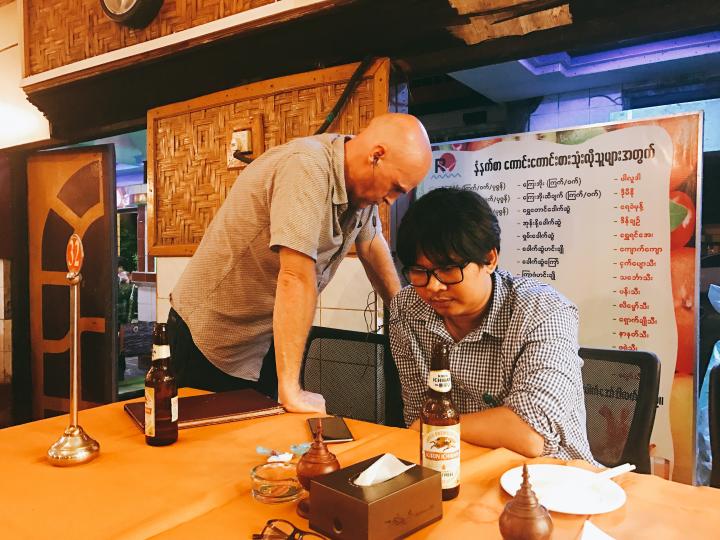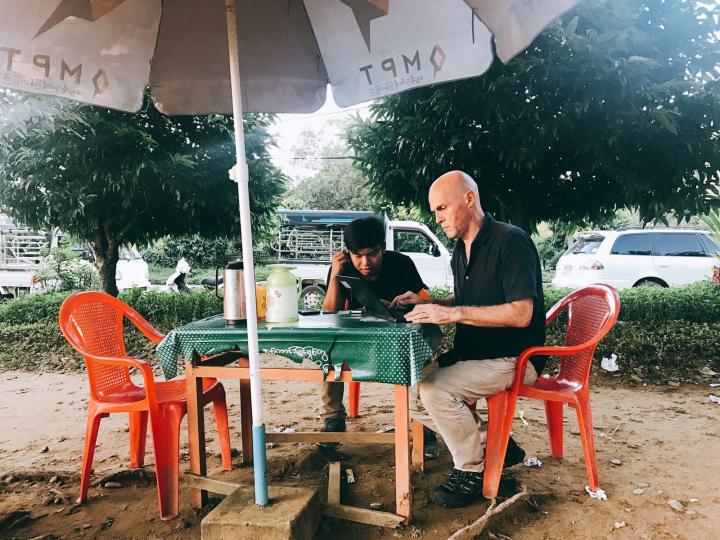Keeping it real
An interview with Pulitzer Prize-winning special correspondent and truth seeker Andrew Marshall.

Today’s trend for deliberate disinformation is blurring the lines between fact and fiction. That’s why the world needs investigative journalists to tell the real story. In the Edit interview, alumnus Andrew Marshall talks about how running the international pages of the University’s student newspaper drew him towards a career as a special correspondent delivering hard-hitting reports across Asia.
What is it about investigative journalism that made you want to enter the field?
I didn’t start out as an investigative journalist, or as any kind of journalist. In 1988 I joined Student, the University of Edinburgh student newspaper, as one of its managers. My chief task was to deliver the newspaper without crashing the office car. Then Student got a new editor – Tom Bradby, of ITN fame – who put me in charge of the international pages. That sparked a fascination for foreign reporting and suddenly made such a career seem possible. I’ve been, for most of my working life, a freelance journalist, which meant I wrote about anything and everything: politics, conflict, sport, books and so on. Only since joining Reuters in 2012 have I dedicated most of my time to investigations.
How did your degree or time at the University influence your career steps?
I remember graduating in 1989, after four wonderful years, thinking: “I’ll probably never have that much fun again.” As it turned out, there was lots more fun to come, but Edinburgh was special. My stint on the student newspaper was short but inspirational; many of the fledgling journalists I knew then – Tom (ITN), Emma Simpson (BBC), Andrew Sparrow (The Guardian) – went on to stellar careers. By the time I graduated, I knew what I wanted to do. Academically, I was an average student, but I enjoyed classes. It’s hard not to feel nostalgic about a period in my life when I had so much time to read and think. I also loved – and still love – the city itself.

You’ve spent most of your career living and working in Asia. What led to you moving there?
I’d like to say that I came to Asia because of a deep fascination for its cultures and languages. In fact, my girlfriend at the time got a job in Japan. I tagged along, fell in love with Asia and stayed. I spent five years in Japan, editing and freelancing, then moved to Thailand in the mid-1990s. Bangkok was a vibrant base from which to explore nearby countries, where I’ve reported on everything from ethnic cleansing to beauty pageants.
At Reuters, you’ve been a member of reporting teams that have won three Pulitzer Prizes for International Reporting. What did you win these prestigious awards for?
One of the prizes was awarded in 2018 for our coverage of a brutal ‘war on drugs’ in the Philippines that killed thousands of people. The others, awarded in 2014 and 2019, were for our coverage of the persecution of Rohingya Muslims in Myanmar. Two Reuters colleagues, Wa Lone and Kyaw Soe Oo, were arrested in Myanmar in December 2017 while investigating the killing of 10 Rohingya men and boys; their report was the centrepiece of ‘Myanmar Burning’, the series that won that latest Pulitzer. They were later sentenced to seven years in jail – simply for doing their jobs.

What is it like to win these awards?
It’s thrilling to win a Pulitzer. As my colleague Wa Lone said, when the news was relayed to his prison cell: “This award is like a dream.” It’s also bittersweet. The prizes were won for reporting on campaigns of violence that have killed or traumatised tens of thousands of people. The hope is always that big awards shine a stronger spotlight on these important issues. Our most recent Pulitzer was particularly bittersweet, since Wa Lone and Kyaw Soe Oo spent 511 days behind bars for reporting so bravely.
In an age where powerful people dismiss real journalism as ‘fake news’, and when reporters are routinely arrested and murdered, Wa Lone and Kyaw Soe Oo are true heroes.
Wa Lone and Kyaw Soe Oo were released from prison in May 2019 after a presidential amnesty. How do you feel about their release?
They are brave and innocent men who did nothing wrong. I’m delighted to see them reunited with their wives and young daughters. In an age where powerful people dismiss real journalism as ‘fake news’, and when reporters are routinely arrested and murdered, Wa Lone and Kyaw Soe Oo are true heroes. They inspire me and remind me why journalism matters. Their detention has triggered an outpouring of support, both internationally and from inside Myanmar. I’d encourage everyone to read a Reuters investigation called ‘Massacre in Myanmar’, which got Wa Lone and Kyaw Soe Oo arrested.
You recently relocated to London after an 18-year stint in Asia. Is there any difference between reporting there and here?
My friends joke that all those years covering political dysfunction in Asia has been great training for covering Brexit Britain. One difference is the level of trust in journalists. I rarely had problems encouraging people in Asia to talk to me. Here, however, journalists are sometimes held in lower esteem, which can make reporting more challenging. I feel lucky to work for Reuters, which has a well-deserved reputation for fairness and accuracy.

Remaining neutral and reporting the facts is a vital part of your role. How do you keep bias out of stories?
Reuters journalists operate on the so-called Trust Principles, which oblige us to act with “integrity, independence and freedom from bias”. On a practical level, this means – to choose one example – making strenuous efforts to seek pre-publication comments from the people and organisations we write about. The journalist Owen Bennett-Jones recently wrote of a BBC editor who “refused to report on a fire in the Strand which he could see with his own eyes until it was confirmed by Reuters”. The story sounds apocryphal, but encapsulates our reputation for factual accuracy.

Who or what are the main influences on your writing and why?
Golden Earth, by the late Norman Lewis, was a big inspiration behind my own book on Myanmar, The Trouser People. His powers of observation and empathy, and the grace of his writing, are breathtaking. My favourite book by a journalist about Southeast Asia is All The Wrong Places, by the poet James Fenton, who captures the warmth and energy of the region. A literary heir to both these writers is Richard Lloyd Parry, whose Ghosts of the Tsunami is a masterclass in reporting. I also read Evelyn Waugh’s Scoop every other year, because it makes me laugh and keeps me grounded. Three of Waugh’s most odious characters – Shumble, Whelper and Pigge – are, like me, special correspondents.
Watch
Watch a video report by BBC Newsnight about the release of Wa Lone and Kyaw Soe Oo.
About Andrew Marshall
Andrew Marshall joined Reuters as a Bangkok-based special correspondent in January 2012. He had spent the previous 17 years as a freelance journalist, exploring Asia’s remotest regions for TIME, the Sunday Times Magazine, National Geographic, Esquire (UK), and many other publications.
While a freelance, he wrote The Trouser People, a book about football and dictatorship in Burma, and co-wrote The Cult at the End of the World, about Japan’s homicidal Aum cult. He also co-produced three documentaries for Al Jazeera – on cholera epidemics in Bangladesh, military torture in Thailand and heroin rehab in Malaysia – and acted as a consultant on a fourth for Channel 4, about apocalypse culture in Israel, Japan and the US.
At Reuters, he was part of the teams that won three Pulitzer Prizes in International Reporting for their coverage of Myanmar’s Rohingya crisis (2014, 2019) and the Philippines’ ‘war on drugs’ (2018). He lives in London with his Swiss wife and two children. He is an English Literature alumnus of the University of Edinburgh.
Questions by Sarah Lincoln, Publishing & Communications Manager at the University, and an English Literature alumna.

